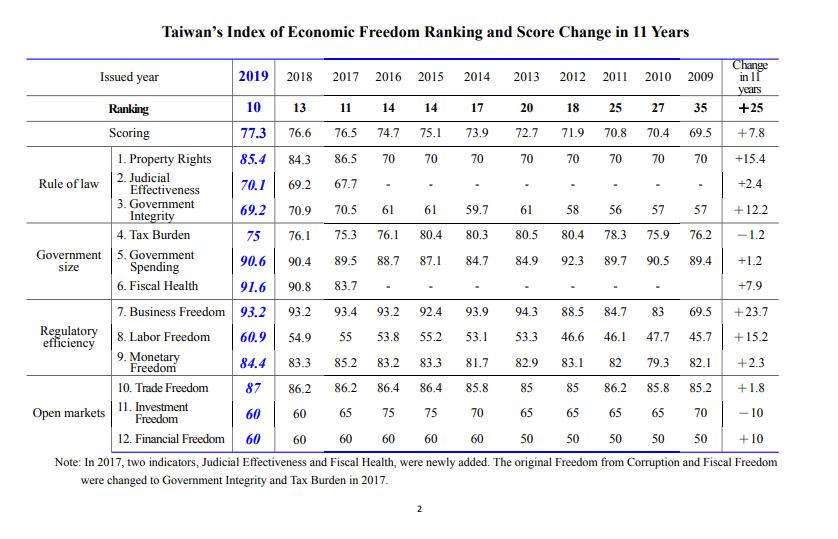Taiwan’s degree of economic freedom rises to the world top 10
In the 2019 Index of Economic Freedom jointly issued by the Heritage Foundation and the Wall Street Journal, Taiwan ranks 10th in the 180 economies rated.

In the 2019 Index of Economic Freedom jointly issued by the Heritage Foundation and the Wall Street Journal, Taiwan ranks 10th in the 180 economies rated. Taiwan’s ranking is up by three places in 2018 and it is 5th of 43 economies in the Asia-Pacific region, notably ahead of Japan and South Korea. This year’s result is the highest Taiwan has achieved since the Heritage Foundation changed the rating method in 2008. Following is the NDC’s explanation of Taiwan’s 2019 ranking.
-
Early last year, the Labor Standards Act was amended. Due to adjustment in labor conditions to pay attention to the rights of both labor and management and promote labor market flexibility, the score this year for Labor Freedom climbed by an impressive six points and was the main reason for the rise in Taiwan’s overall ranking. Also, this year Taiwan performed better than last year for Property Rights, Judicial Effectiveness, Government Spending, Fiscal Health, Monetary Freedom and Trade Freedom.
-
With respect to overall freedom, the Heritage Foundation affirmed Taiwan’s sound business regulations and open market policy, and free flow of goods and capital that have allowed small and medium sized enterprises to thrive and make them the backbone of Taiwan’s economic development. Taiwan also has a good legal framework that protects people’s property rights.
-
The Heritage Foundation suggested that while Taiwan pursues the policy objective of reducing excessive reliance on Mainland China, it should strive to further increase competitiveness and continue to open its markets at the same time. In this respect, at the end of last year the government vigorously promoted the Welcome Taiwanese Companies Abroad to Invest in Taiwan Action Plan; oriented towards the needs of businesses, it provides a customized single window service, integrating land, utilities, manpower, tax and capital and other competitiveness-promoting measures to actively assist Taiwanese enterprises that are based overseas to invest in Taiwan.
-
In terms of other indicators, the score for Tax Burden was down by 1.1 point due to the increase in the business income tax rate from 17% to 20%. The score for Investment Freedom and Financial Freedom stayed the same as last year; in these areas, the Statute for Investment by Foreign Nationals and Statute for Investment by Overseas Chinese, which will loosen restrictions on investment by foreigners and overseas Chinese, are currently being reviewed by the Legislative Yuan. The Financial Supervisory Commission is also continuing to relax financial regulations, which will be advantageous for achieving higher rankings in future.
-
In the area of regulatory loosening and market opening policies, the NDC launched deregulation work in October 2017, beginning with financial and economic interpretative rules, administrative directions, regulations and rules, with the aim of clearing away investment barriers and implementing palpable deregulation. In less than one and a half years, 427 outdated regulations and interpretative rules have been eased, the scope extending to relaxing regulations relating to business operation and finance; the benefits gained include providing diverse fund-raising channels, increasing the flexibility of manpower use and boosting government administrative efficiency.
-
Also, as regards increasing competitiveness, at present, the Policy of Developing Taiwan into a Bilingual Nation and the New Economic Immigration Policy are being actively promoted and aim to nurture the ability of citizens to communicate in English as well as supplement domestic human capital; through open data, Big Data use and electronic government, the Taiwan Smart Government Blueprint will provide more transparent and higher quality citizen services and also optimize decision making quality, all conducive to Taiwan’s economic development and advancing its international competitiveness.This year’s Index of Economic Freedom shows that our efforts towards achieving a high level of economic freedom have won international affirmation. In future, the NDC will continue to facilitate government agencies’ deregulation efforts and will, on a yearly basis, collect and organize related reform measures and provide them to the Heritage Foundation for reference to allow the Foundation to keep abreast of the progress and results of Taiwan’s various ongoing reforms.
Related File(s)
Comparison of Taiwan’s 2019 Index of Economic Freedom Ranking and Score Change
Taiwan’s degree of economic freedom rises to the world top 10
Date: 2021-03-16
Source: National Development Council